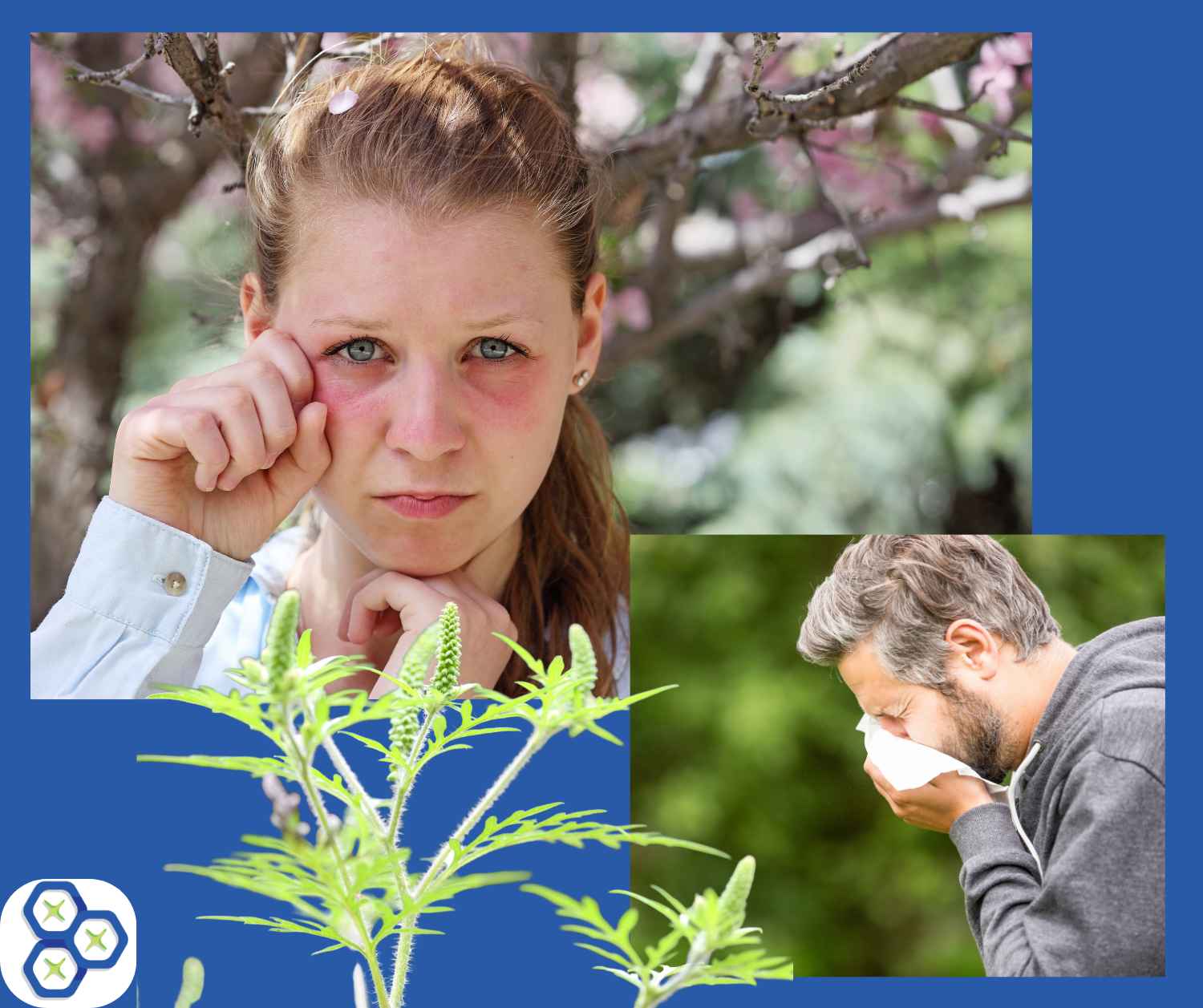Seasonal Allergy Symptoms: Signs You Shouldn’t Ignore
Seasonal allergies…the moment you feel it—that first tickle in your throat, the subtle itch behind your eyes, the sneeze that seems to come from nowhere. Your heart sinks because you know what’s coming: weeks or months of misery, medications that leave you feeling like a zombie, and the frustration of being told “it’s just allergies” when your entire life is being hijacked by symptoms.
If you’re among the 60 million Americans who battle seasonal allergies each year, you know this isn’t “just” anything—it’s an exhausting war between your body and the environment that can drain your energy, cloud your thinking, and isolate you from the outdoor activities everyone else seems to enjoy effortlessly.
What if there was another way? What if the key to lasting relief wasn’t in managing symptoms but in rebalancing your body from within?
This is the story of Bob, someone who might seem surprisingly familiar, and his journey from allergic prisoner to freedom—a path that might just change everything you thought you knew about your seasonal suffering.
Bob’s Journey Through Seasonal Allergies: Finding Natural Relief
Bob dreaded spring every year. As soon as the trees began budding and flowers started blooming, his body declared war on itself. His eyes would become red, itchy, and watery. His nose would run constantly, and he’d sneeze so frequently that his coworkers started keeping a box of tissues on his desk. The congestion made it difficult to breathe, and the brain fog made it hard to concentrate at work. At night, he’d toss and turn, unable to breathe properly, waking up feeling exhausted.
“It’s just allergies,” doctors would tell him, prescribing antihistamines that left him feeling drowsy and disconnected. But Bob wondered if there was more to his suffering—and if there were natural ways to find relief.
Bob’s experience mirrors what millions suffer through each year.
The most common seasonal allergy symptoms include:
- Sneezing: Often occurs in fits of several sneezes in a row
- Runny or stuffy nose: Clear, thin nasal discharge that seems never-ending
- Watery, red, or itchy eyes: The hallmark of eye allergies (allergic conjunctivitis)
- Itchy throat, ears, or sinuses: That persistent tickle that won’t go away
- Postnasal drip: Leading to coughing, especially at night
- Fatigue: Fighting allergies is exhausting for your immune system
- Brain fog: Difficulty concentrating or thinking clearly
- Dark circles under eyes: Often called “allergic shiners”
- Headaches: Particularly sinus headaches from congestion
- Wheezing or shortness of breath: Especially in those with asthma
For Bob, these symptoms weren’t just inconvenient—they significantly impacted his quality of life for months each year.
Why Do I Have Seasonal Allergies: Understanding the Root Cause
When Bob asked his doctor why his body reacted so violently to harmless tree pollen, he learned that his immune system was essentially making a mistake.
Seasonal allergies, or allergic rhinitis, occur when your immune system identifies harmless airborne substances as dangerous invaders. When you inhale allergens like pollen, your immune system produces antibodies called Immunoglobulin E (IgE). These antibodies signal your cells to release chemicals like histamine, which trigger the inflammatory response we recognize as allergy symptoms.
Common seasonal allergens include:
- Spring: Tree pollen (oak, birch, cedar, maple, elm)
- Summer: Grass pollen (Bermuda, Timothy, Johnson)
- Fall: Weed pollen (ragweed, sagebrush, tumbleweed)
- Year-round: Mold spores, which can spike during wet seasons
But why do some people like Bob suffer terribly while others remain symptom-free?
- Genetic predisposition: If allergies run in your family, you’re more likely to develop them
- Immune system imbalance: An overactive immune response or underlying inflammation
- Environmental exposures: Early life exposures can shape immune system development
- Mineral imbalances, which affect immune function and inflammatory responses
This last point was something Bob hadn’t considered—until he learned about hair tissue mineral analysis.
Best Natural Allergy Relief Remedies
After years of suffering, Bob began researching natural approaches to allergy relief. He discovered several evidence-supported options.
Nutritional support for seasonal allergies year-round:
- Local honey: Contains small amounts of local pollen, potentially helping desensitize the immune system
- Quercetin-rich foods: Apples, onions, and berries contain this natural antihistamine
- Omega-3 fatty acids: Found in fatty fish and flaxseeds, these reduce inflammatory responses
- Vitamin C: Provides natural antihistamine effects and boosts immune function
- Vitamin D: Often deficient in allergy sufferers and crucial for immune regulation
How to Get Rid of Seasonal Allergies Naturally
All medications are derived from natural plants and substances, so we can find a solution without the laundry list of symptoms or side effects listed on medication inserts.
Top Homeopathic Remedies for Seasonal Allergies:
My top picks to have on hand in your natural medicine cabinet are from Energetix. This kit can only be ordered by contacting me.
Energetix Seasonal Allergy Survival Kit—a trio of targeted formulas to support respiratory and immune balance.
- Aller-Chord A – Comprehensive homeopathic formula for a broad range of seasonal, airborne allergy symptoms.
- Sinus-Tone – Formulated for sinus congestion, mucosal imbalances, headaches, discharge, dry membrane, and hayfever.
- Drainage-Tone – Open body drainage pathways from every cell. For swollen glands, sinus congestion, mucous, and skin eruptions.
- Inflamma-Tone – Helps with exposure to pathogens, cellular detritus, and irritants. For fever, chills, swelling, pain, cough, glands, etc.
- Throat Spray Tone – Immediate soothing and long-term relief for throat irritation and seasonal allergy concerns.
- Core Elderberry Blend – A spagyric botanical blend featuring elderberry and echinacea to help support respiratory function when it’s needed the most.
Other Homeopathic suggestions:
- Allium cepa: For a runny nose with burning discharge and watery eyes
- Natrum muriaticum: For watery eyes, sneezing, and a runny nose with clear discharge
- Sabadilla: For persistent sneezing attacks and an itchy nose
- Euphrasia: For burning, watery eyes and mild nasal symptoms
- Nux vomica: For irritability with allergies and congestion
Herbal Allies:
- Nettle leaf: A natural antihistamine that can reduce symptoms
- Butterbur: Shown in studies to be as effective as some OTC antihistamines
- Eyebright: Particularly helpful for eye-related symptoms
- Elderberry: Boosts overall immune function
- Baical skullcap: Reduces histamine release
Practical Approaches to Seasonal Allergies:
- Saline nasal irrigation: Using a neti pot to flush allergens
- HEPA air purifiers: Removing allergens from indoor air
- Changing clothes after being outdoors: Reducing allergen exposure
- Exercising indoors on high pollen days: Minimizing exposure during workouts
Hair Tissue Mineral Analysis: The Missing Link in Seasonal Allergy Treatment
When Bob discovered hair tissue mineral analysis (HTMA), he was skeptical but desperate. After years of treating symptoms, he wanted to address the root cause of his overreactive immune system.
When conventional treatments failed to provide lasting relief, Bob discovered a testing method that traditional allergists rarely mention: Hair Tissue Mineral Analysis (HTMA).
“I was skeptical at first,” Bob admits. “How could analyzing my hair reveal anything about my allergies? But I was desperate enough to try anything.”
What HTMA Revealed About Bob’s Allergies
Bob’s hair analysis uncovered several critical imbalances that were directly contributing to his hypersensitive immune response:
- Depleted Zinc Levels: Zinc is crucial for immune regulation and natural anti-inflammatory responses. Bob’s levels were significantly below the optimal range, compromising his body’s natural ability to modulate immune reactions.
- Copper Dysregulation: Elevated unbound copper was discovered in Bob’s analysis. This excess copper stimulates histamine release—the very chemical responsible for allergy symptoms.
- Magnesium Deficiency: Bob’s cellular magnesium was depleted, compromising his body’s natural bronchodilation mechanisms and increasing histamine sensitivity.
- Toxic Metal Burden: The presence of cadmium and aluminum—metals known to trigger immune reactivity and inflammation—was detected at concerning levels. He also had hidden toxicity of lead and mercury, which can trigger immune reactivity.
- Disrupted Sodium/Potassium Ratio: Bob’s ratio indicated adrenal stress, affecting cortisol production—the body’s natural anti-inflammatory hormone.
- Low levels of Selenium: The thyroid was unable to convert T4 to T3 for systemic energy.
- Poor sodium/potassium ratio: Indicating adrenal stress affecting his body’s natural anti-inflammatory responses
The Mineral-Immune Connection
“What most allergy sufferers don’t realize,” I explained, “is that minerals are the foundation of immune function. They serve as cofactors for enzymes that manage inflammation, act as signaling molecules for immune cells, and help maintain the integrity of mucous membranes. They are your first line of defense against allergens.”
Research has shown that specific mineral imbalances can directly influence allergic responses:
- Zinc deficiency compromises T-cell function and increases inflammatory cytokine production
- Magnesium insufficiency contributes to bronchial hyperreactivity and histamine release
- Selenium depletion reduces the body’s antioxidant defenses against inflammatory damage
- Copper excess stimulates histamine release and increases tissue sensitivity
- Manganese imbalances affect superoxide dismutase, a key anti-inflammatory enzyme
- With this personalized information, Bob worked with me to:
- Balance essential minerals: Supporting proper immune signaling
- Reduce heavy metal burden: Decreasing overall immune reactivity
- Support detoxification pathways: Helping his body process and eliminate allergens
- Strengthen adrenal function: Improving his natural stress and inflammatory responses
HTMA provided insights that no other test had offered—showing how Bob’s unique biochemistry was contributing to his allergy susceptibility.
Personalized Mineral Rebalancing Protocol
Based on his HTMA results, Bob received a customized protocol that included:
- Targeted Supplementation: Precise mineral supplementation based on his unique mineral patterns, not one-size-fits-all formulas
- Detoxification Support: Specific nutrients to help safely eliminate the heavy metals contributing to his immune dysfunction
- Dietary Modifications: Food recommendations aligned with his metabolic type to naturally correct imbalances
- Stress Management Techniques: Practices designed to improve his adrenal function and mineral retention
Unlike antihistamines that just block symptoms temporarily this approach was about correcting the underlying biochemical environment that was making his body overreact to pollen in the first place.
How to Stop Seasonal Allergies: A Complete Action Plan
The Science Behind Mineral Balancing for Allergies
HTMA provides unique insights that blood tests often miss. While blood levels are homeostatically controlled (your body works hard to maintain consistent blood levels), hair analysis reveals what’s happening at the cellular level over time. It shows the cellular savings account levels that are donating to the blood on demand.
Studies have shown that mineral imbalances can persist for years without showing up in blood work, all while creating the perfect biological environment for allergic hypersensitivity.
By addressing these fundamental biochemical imbalances, many allergy sufferers experience what conventional medicine would consider unexpected improvements:
- Reduced reactivity to multiple allergens (pollen, mold, foods, chemicals, etc.)
- Decreased dependency on medications
- Improved tolerance to previously problematic environments
- Enhanced recovery from exposure
- Better stress resilience during allergy season
The conventional western approach treats everyone with seasonal allergies the same way, but HTMA allows us to see exactly how YOUR body is unique, and why YOUR immune system is overreacting.
Bob’s Transformation
After six months of targeted supplementation based on his HTMA results, combined with the natural remedies that worked best for his specific symptoms, Bob noticed something remarkable: spring arrived, but his allergies didn’t—at least not with their usual vengeance. We even corrected his cellular membrane imbalance which eliminated his inflammation in his body each morning!
He still experienced mild symptoms on high pollen days, but the debilitating reactions were gone. He could enjoy outdoor activities, see without runny or puffy eyes, sleep through the night, and function without brain fog clouding his thinking.
Hair Analysis and Seasonal Allergies
By addressing the underlying mineral imbalances and supporting his body’s natural regulatory systems, Bob had finally found the comprehensive relief he’d been seeking for years.
If you’re like Bob, tired of just managing allergy symptoms, consider how a deeper look at your body’s mineral balance might provide the missing piece to your allergy puzzle. Hair Tissue Mineral Analysis offers a window into the biochemical factors that conventional allergy treatments often overlook.
Would you like to learn more about how HTMA could help with your seasonal allergies?
Contact us to schedule a complimentary consultation and begin your journey toward real relief.
Copyright Scientific Nutrition, LLC 2025




